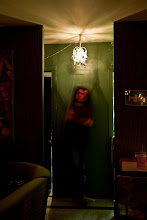J.J Abrams



and Ryan Murphy


have new projects that have recently been released. Abrams with the franchise prequel "Star Trek"

and Murphy with the "High School Musical" network tv appropriation "Glee".

While each project has the clear stamp of their maker's style and thematic interests, only one is a true winner.
What I like about Abrams is that he has a strong command of the three key ingredients to a successful adventure story - character development, hairpin plot turns and technical virtuosity. The extensive mythology and plotlines in "Lost" and the very premise of "Alias" demonstrate that Abrams understands a good yarn in a modern context. He combined this with popcorn thrills to great effect in "Mission Impossible 3", which was the best of the series and featured some great action scenes. He clearly has spent some serious time studying the sequences of Steven Spielberg, Sam Peckinpah and John Woo. Abrams also always takes time to establish his characters and let them develop with his twisty plots, so there is a core of emotional authenticity to the stories.
All of these were put to good use with "Star Trek", but there was one additional element of Abrams's repetoire (that he has used in every project) which diminished the overall experience: time travel. (kinda spoiler) "Star Trek" could have been perfect if Abrams had followed through with the linear narrative he was establishing by introducing each character and letting the plot move at a mid-boil. Instead, he felt the need to go all "Lost" on us, with multiple realities of time occurring simultaneously for the sake of sneaking in Leonard Nimoy. I get it, he wanted to bridge the old and new series. But Abrams should've just trusted his own storytelling facilities and let the kids have their run on the Enterprise. Enough with the time crap already J.J.!!!!
So surprisingly, Ryan Murphy wins with "Glee". Now this is surprising for a couple of reasons. First off, "Nip/Tuck" seriously sucks now. It started out as a culturally transgressive show where a plastic surgery office was a springboard to explore issues of morality, beauty, age, sexuality, and emotional intimacy. This was done through (at times) shockingly raw and outrageous plotlines that nonetheless allowed the viewer to reflect upon serious ideas. Like the best Aldomovar films, early "Nip/Tuck" rode a successfully delicate line between camp, tragedy, parody and drama. But that period is over, and "Nip/Tuck" is now a parody of itself.
I had assumed Murphy had lost his touch, but he has really regained it with "Glee". On paper, this show is simply riding on the coattails of the "High School Musical" franchise. The premise is simply one teacher's attempt to revitalize his old high school's glee club (which for those, including myself, who don't exactly know, is essentially a musical theater club). So my second surprise is that "Glee" takes all the best elements of the "High School Musical" series (charismatic young performers, strong production numbers, playful self-awareness of high school narrative tropes) and mostly one ups them while forgoing the chaste, vaguely christian, blandly multicultural atmosphere of its predecessor. The tone of "Glee" winningly flips between Murphy's signature poles of camp and drama, and can at times be humorously harsh. For instance, the football team mockingly signs up for the club under the name "penis" and the star singer belts out a wholly compelling ballad before the scene quickly cuts to her having red fruit punch thrown in her face. My only concern is that Murphy further develops the secondary characters, who in the pilot were relegated to the wheelchair kid as comedic relief, the black girl as deliverer of sassy one-liners and the asian girl as inarticulate sexpot. So I'll keep my fingers crossed on that.
On another plus side, Murphy is working with a fantastic music director who not only chooses very cheeky, clever songs for the production numbers ("Rehab" by Amy Winehouse, "Dont Stop Believing" by Journey") but employs accapella music as the background score, which both supports the show's premise and adds wonderful texture. DEF check out "Glee" online and when it returns in regular rotation.

No comments:
Post a Comment